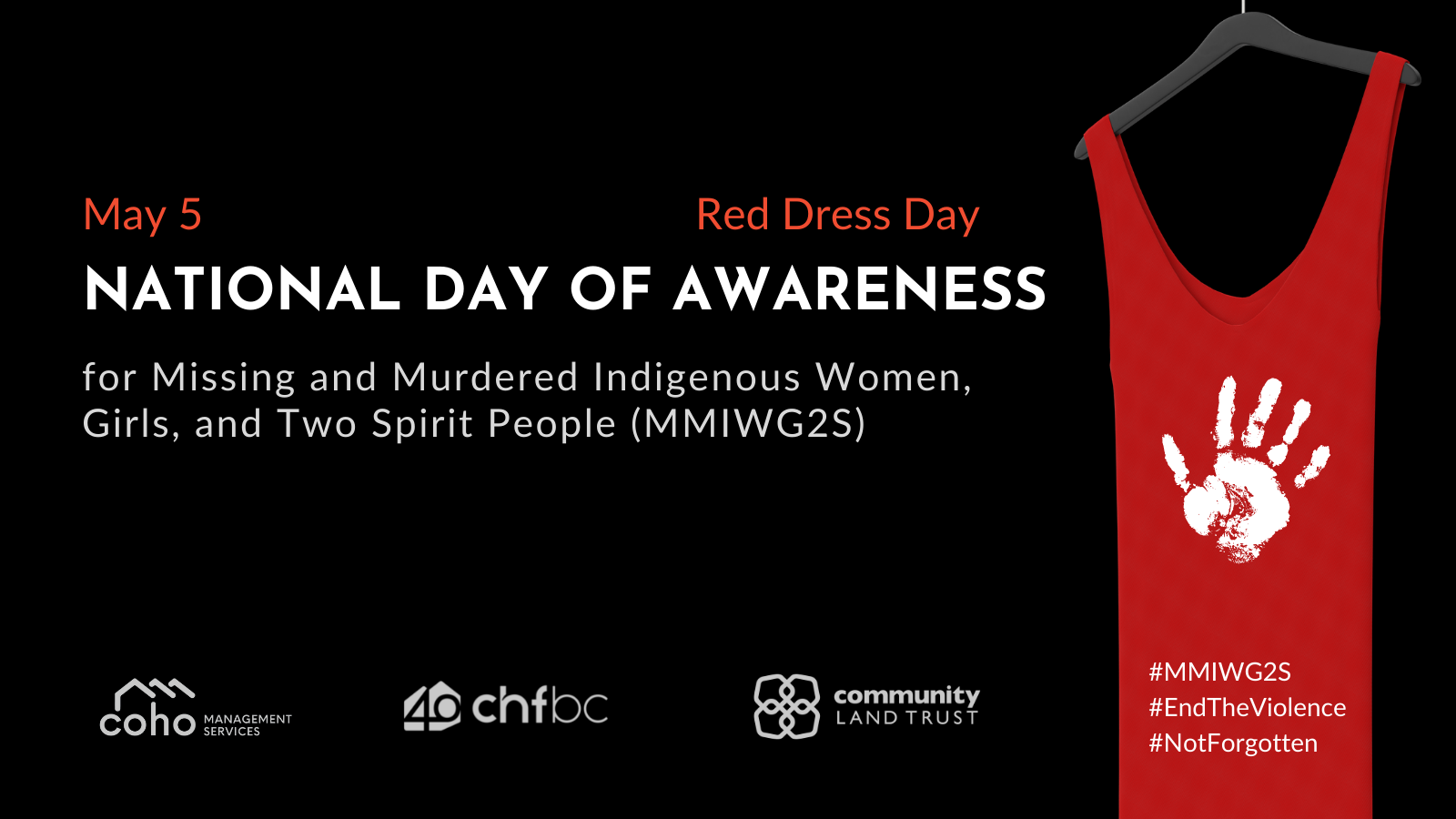
May 5 is Red Dress Day
May 5 is Red Dress Day, the National Day of Awareness for Missing and Murdered Indigenous Women, Girls and 2SLGBTQQIA+ (Two-Spirit, lesbian, gay, bisexual, transgender, queer, questioning, intersex and asexual plus) people. This event was originally held on May 5, 2010 and continues annually.
Origins
The day was was borne out of the ongoing art project called The REDress Project by Jaime Black, a Métis multidisciplinary artist based in Winnipeg. The red dresses act as a visual reminder of the more than 1,000 Indigenous woman, girls, and Two-Spirit people who are missing or who have been murdered, and those whose lives have been forever changed by such violence.
Canada’s colonial and present has a lasting and negative impact on Indigenous communities. The legacies of residential schools, the 60s scoop, and ongoing colonization including resource theft and socio-economic conditions like poverty often fall the hardest on women and gender diverse people.
This history, along with sexism, ableism, racism, homophobia, transphobia as well as the actions and inactions of governments, create systemic discrimination and inequities. These issues must be addressed in order for Indigenous women, girls, and 2SLGBTQQIA+ people to be safe wherever they live.
Our Commitment
CHF BC is dedicated to the principles of anti-racism and an end to racial discrimination. While some progress has been made Indigenous peoples in Canada still face racism and discrimination every day. We are taking action to tackle hate and discrimination through our strategic priority of ‘belonging.’ We aim to inspire housing co-ops to be communities that promote and embody equitable access, opportunity, respect, and a sense of belonging for everyone by:
- Working with housing co-ops to identify and work to remove barriers to equity and inclusion;
- Modeling best practices to promote equity and inclusion and to increase diversity among CHF BC directors, staff, workshop leaders, contractors, and consultants; and,
- Reviewing and refreshing our education program, management services and development practices to reflect this strategic priority.
Support Services

The day can be triggering for those affected by missing and murdered Indigenous woman, girls, and Two-Spirit people.
- For immediate emotional assistance, call the MMWIG2S+ support line at 1-844-413-6649. It is an independent, national, toll-free support call line support line. This line is available free of charge, 24 hours a day, 7 days a week.
- There is also an Indigenous-specific Hope for Wellness Helpline at 1-855-242-3310. They offer Indigenous crisis counselling including in some Indigenous languages.
- You can also access long-term health support services such as mental health counselling, community-based emotional support and cultural services. Some travel costs to see Elders and traditional healers can also be covered.
- The National Indigenous Women’s Resource Center has created a MMIW Toolkit for Families and Communities.
What you Can Do
Solidarity is only meaningful if it is substantive and not merely performative. This means showing up to support the community with your presence alone should be the baseline, not the end game.
Amnesty International
The day is about building awareness of this ongoing harm and honouring those we have lost and their families. You can mark the day by:

- Reading—or re-reading—the 2019 National Inquiry on Missing and Murdered Indigenous Women and Girls (MMIWG) report, Reclaiming Power and Place, and it’s 231 Calls for Justice to raise awareness, broaden your understanding, and learn how to take further action.
- Wear red to raise awareness about this important issue among your family, friends and colleagues.
- Hang a red dress in your window or your yard.
- Men can wear also a piece of moose hide to show you are standing up against violence towards women and children.
- Post images and messages of solidarity and awareness to social media. Use hashtags such as: #MMIWG2S, #RedDressDay, #WhyWeWearRed, #EndTheViolence, #NotForgotten and #NoMoreStolenSisters
- Make a donation to a Indigenous organization works with Indigenous Women, girls and two-spirited people such as the Downtown Eastside Women’s Centre or Pacific Association of First Nations Women (PAFNW).
- Join PAFNW at Vancouver City Hall at 12:00pm on May 5 to honour our sisters and support the families of #MMIWG2S. For those not able to attend in person, you can also watch a livestream of the event on Facebook
Further Resources and Readings

- MMIWG National Inquiry Website
- The Moose Hide Campaign
- Native Women’s Association of Canada (NWAC)
- National Indigenous Women’s Resource Center (NIWRC)
- Lil’ Red Dress Project, Vancouver Island
- Highway of Tears, Carrier Sekani Family Services
- How Red Dresses Became a Symbol for Missing and Murdered Indigenous Women, Vogue
- In photos: MMIWG+ honoured through red dress events, ceremonies, IndigiNews
- Beyond Red Dress Day: Seven calls to action for Indigenous allies, APTN News
- 10 Ways to Be a Genuine Ally to Indigenous Communities, Amnesty International
- Five women all Canadians should know, Canadian Museum for Human Rights
- There is a direct connection between violence against the earth and violence against women: looking to the past to restore our future. Lecture by Lee Maracl (video)
If you have further resources that you would like to share, please send an email to communications@chf.bc.ca.